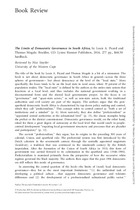The limits of democratic governance in South Africa, by Louis A. Picard and Thomas Mogale
Abstract
The title of the book by Louis A. Picard and Thomas Mogale is a bit of a misnomer. The book is not about democratic governance in South Africa in general—across the three spheres of government— but about democracy at the level of the ‘‘local state.’’ More specifically, the focus tends to be on the local state in rural areas, where 39 percent of the population resides. The ‘‘local state’’ is defined by the authors as the entire state system that functions at a local level, and thus includes the national government working in a deconcentrated form and the elected local governments proper. As the focus is on ‘‘governance’’ and ‘‘quasi-state actors,’’ as well as non-state actors, both the traditional
authorities and civil society are part of the inquiry. The authors argue that the post-apartheid democratic South Africa is characterized by top-down policy making and control, which they call ‘‘prefectoralism.’’ This concept refers to central control as ‘‘both a set of institutions and a mindset’’ (p. 6). More narrowly, they also define ‘‘prefectoralism’’ as ‘‘appointed central authorities at the subnational level’’ (p. 15), the classic examples being the prefect or the district commissioner. Democratic governance would, on the other hand, entail for them a great degree of autonomy at the local level that would result in people-centred development ‘‘requiring local government structures and processes that are pluralist and participatory’’ (p. 13).

